Emotional Intelligence and Job Satisfaction in Contemporary HRM
VerifiedAdded on 2023/06/15
|22
|4252
|144
Report
AI Summary
This report investigates the relationship between emotional intelligence and job satisfaction, highlighting the significance of emotional intelligence in modern business environments. It explores how emotional intelligence influences an individual's ability to monitor and manage emotions, which in turn affects job satisfaction and overall organizational performance. The research includes a review of existing literature, theoretical models such as the Trait's Model, and a conceptual framework linking emotional understanding and management to job satisfaction and organizational behavior. A survey conducted among employees of Virgin Atlantic Airlines provides practical insights into these dynamics, supporting the hypothesis that emotional intelligence positively correlates with job satisfaction. Desklib provides this student contributed document along with a wide range of study tools.
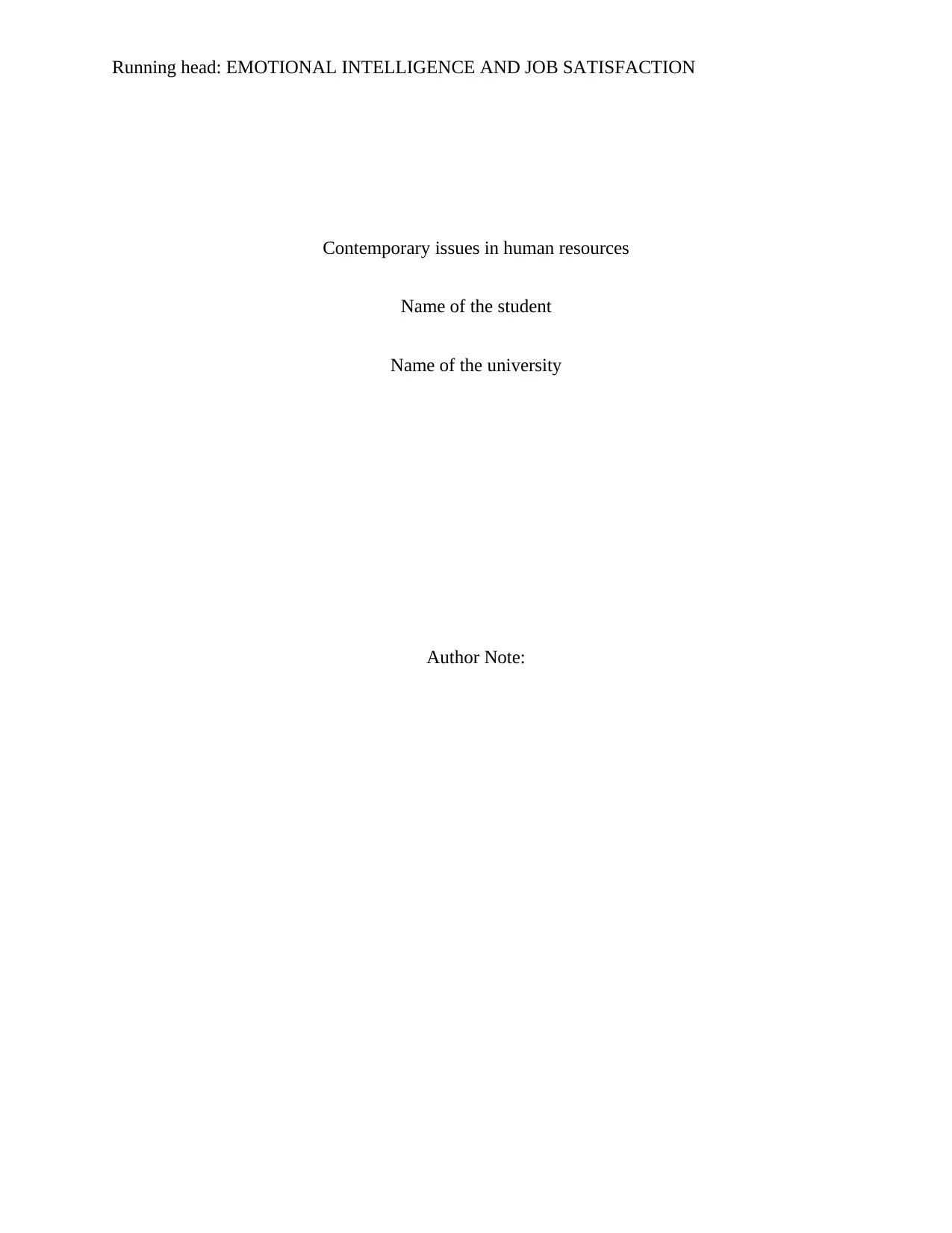
Running head: EMOTIONAL INTELLIGENCE AND JOB SATISFACTION
Contemporary issues in human resources
Name of the student
Name of the university
Author Note:
Contemporary issues in human resources
Name of the student
Name of the university
Author Note:
Paraphrase This Document
Need a fresh take? Get an instant paraphrase of this document with our AI Paraphraser
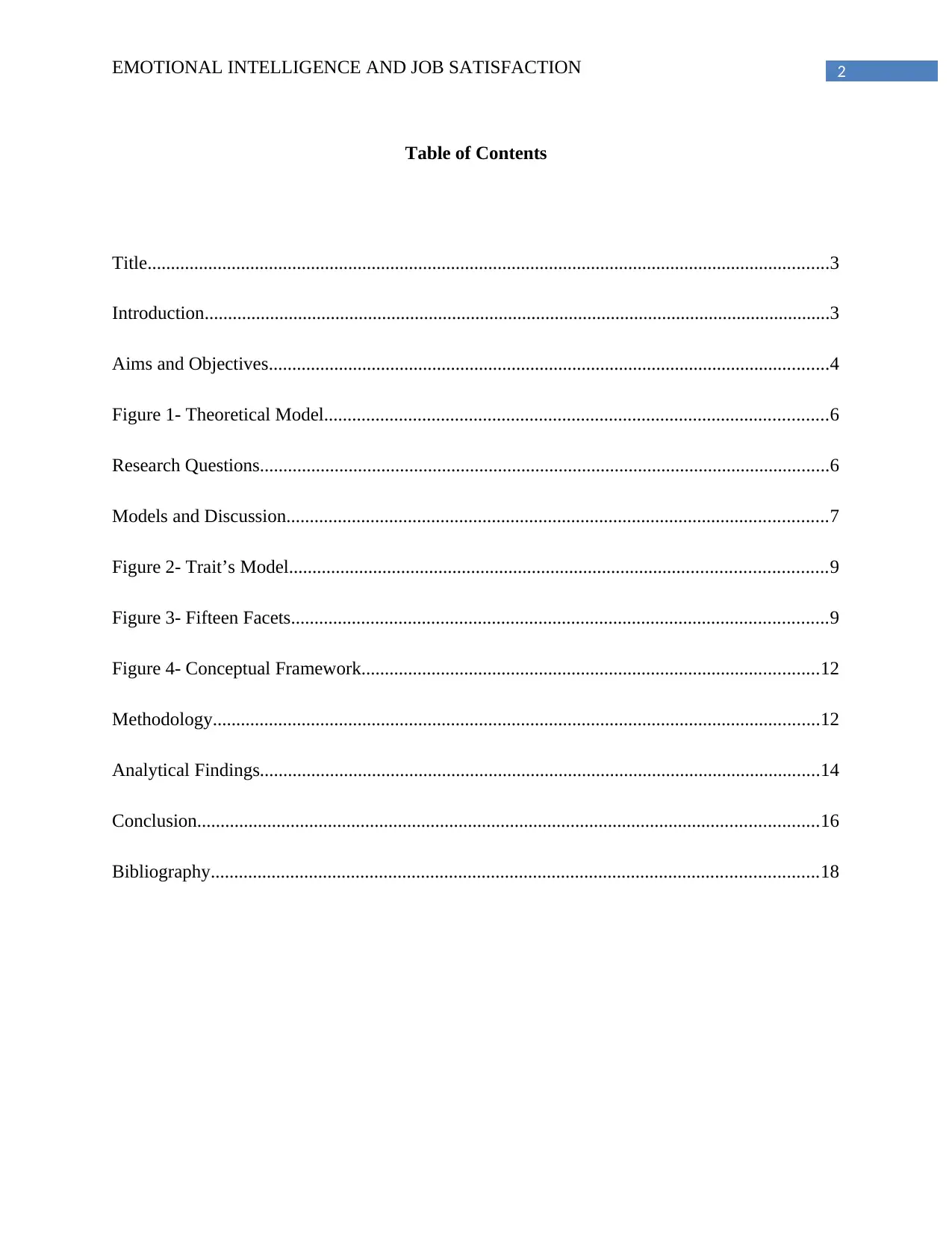
2EMOTIONAL INTELLIGENCE AND JOB SATISFACTION
Table of Contents
Title..................................................................................................................................................3
Introduction......................................................................................................................................3
Aims and Objectives........................................................................................................................4
Figure 1- Theoretical Model............................................................................................................6
Research Questions..........................................................................................................................6
Models and Discussion....................................................................................................................7
Figure 2- Trait’s Model...................................................................................................................9
Figure 3- Fifteen Facets...................................................................................................................9
Figure 4- Conceptual Framework..................................................................................................12
Methodology..................................................................................................................................12
Analytical Findings........................................................................................................................14
Conclusion.....................................................................................................................................16
Bibliography..................................................................................................................................18
Table of Contents
Title..................................................................................................................................................3
Introduction......................................................................................................................................3
Aims and Objectives........................................................................................................................4
Figure 1- Theoretical Model............................................................................................................6
Research Questions..........................................................................................................................6
Models and Discussion....................................................................................................................7
Figure 2- Trait’s Model...................................................................................................................9
Figure 3- Fifteen Facets...................................................................................................................9
Figure 4- Conceptual Framework..................................................................................................12
Methodology..................................................................................................................................12
Analytical Findings........................................................................................................................14
Conclusion.....................................................................................................................................16
Bibliography..................................................................................................................................18
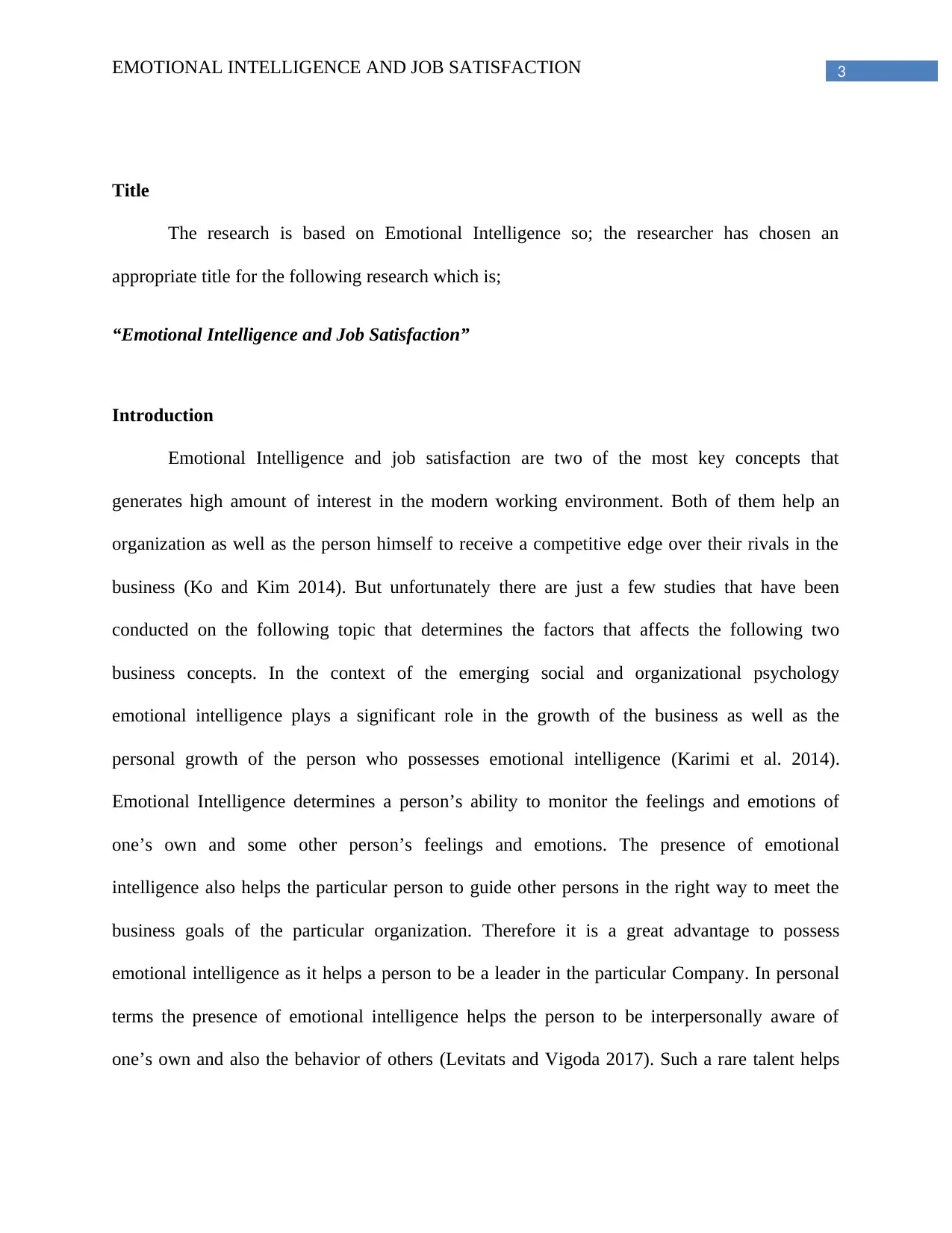
3EMOTIONAL INTELLIGENCE AND JOB SATISFACTION
Title
The research is based on Emotional Intelligence so; the researcher has chosen an
appropriate title for the following research which is;
“Emotional Intelligence and Job Satisfaction”
Introduction
Emotional Intelligence and job satisfaction are two of the most key concepts that
generates high amount of interest in the modern working environment. Both of them help an
organization as well as the person himself to receive a competitive edge over their rivals in the
business (Ko and Kim 2014). But unfortunately there are just a few studies that have been
conducted on the following topic that determines the factors that affects the following two
business concepts. In the context of the emerging social and organizational psychology
emotional intelligence plays a significant role in the growth of the business as well as the
personal growth of the person who possesses emotional intelligence (Karimi et al. 2014).
Emotional Intelligence determines a person’s ability to monitor the feelings and emotions of
one’s own and some other person’s feelings and emotions. The presence of emotional
intelligence also helps the particular person to guide other persons in the right way to meet the
business goals of the particular organization. Therefore it is a great advantage to possess
emotional intelligence as it helps a person to be a leader in the particular Company. In personal
terms the presence of emotional intelligence helps the person to be interpersonally aware of
one’s own and also the behavior of others (Levitats and Vigoda 2017). Such a rare talent helps
Title
The research is based on Emotional Intelligence so; the researcher has chosen an
appropriate title for the following research which is;
“Emotional Intelligence and Job Satisfaction”
Introduction
Emotional Intelligence and job satisfaction are two of the most key concepts that
generates high amount of interest in the modern working environment. Both of them help an
organization as well as the person himself to receive a competitive edge over their rivals in the
business (Ko and Kim 2014). But unfortunately there are just a few studies that have been
conducted on the following topic that determines the factors that affects the following two
business concepts. In the context of the emerging social and organizational psychology
emotional intelligence plays a significant role in the growth of the business as well as the
personal growth of the person who possesses emotional intelligence (Karimi et al. 2014).
Emotional Intelligence determines a person’s ability to monitor the feelings and emotions of
one’s own and some other person’s feelings and emotions. The presence of emotional
intelligence also helps the particular person to guide other persons in the right way to meet the
business goals of the particular organization. Therefore it is a great advantage to possess
emotional intelligence as it helps a person to be a leader in the particular Company. In personal
terms the presence of emotional intelligence helps the person to be interpersonally aware of
one’s own and also the behavior of others (Levitats and Vigoda 2017). Such a rare talent helps
⊘ This is a preview!⊘
Do you want full access?
Subscribe today to unlock all pages.

Trusted by 1+ million students worldwide
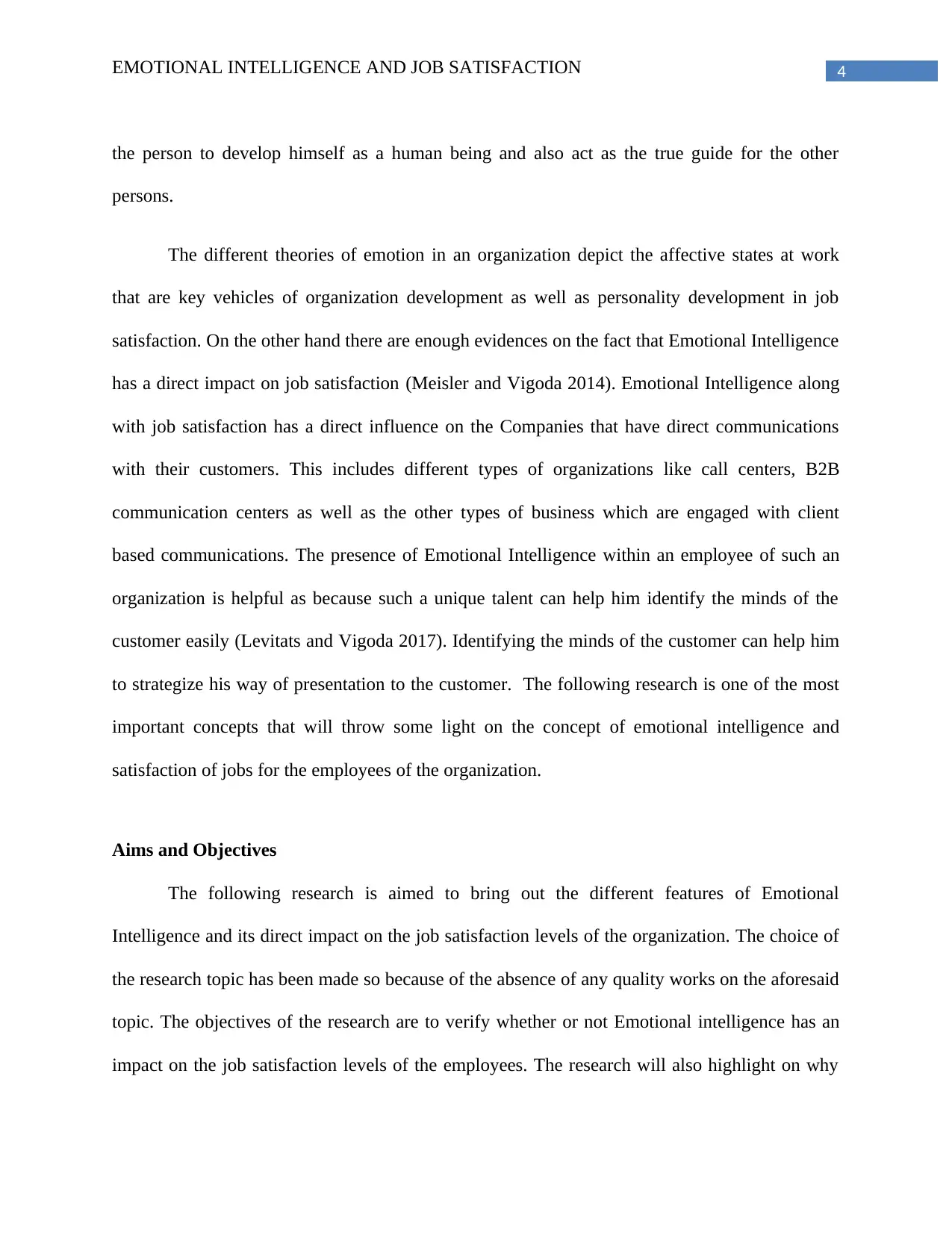
4EMOTIONAL INTELLIGENCE AND JOB SATISFACTION
the person to develop himself as a human being and also act as the true guide for the other
persons.
The different theories of emotion in an organization depict the affective states at work
that are key vehicles of organization development as well as personality development in job
satisfaction. On the other hand there are enough evidences on the fact that Emotional Intelligence
has a direct impact on job satisfaction (Meisler and Vigoda 2014). Emotional Intelligence along
with job satisfaction has a direct influence on the Companies that have direct communications
with their customers. This includes different types of organizations like call centers, B2B
communication centers as well as the other types of business which are engaged with client
based communications. The presence of Emotional Intelligence within an employee of such an
organization is helpful as because such a unique talent can help him identify the minds of the
customer easily (Levitats and Vigoda 2017). Identifying the minds of the customer can help him
to strategize his way of presentation to the customer. The following research is one of the most
important concepts that will throw some light on the concept of emotional intelligence and
satisfaction of jobs for the employees of the organization.
Aims and Objectives
The following research is aimed to bring out the different features of Emotional
Intelligence and its direct impact on the job satisfaction levels of the organization. The choice of
the research topic has been made so because of the absence of any quality works on the aforesaid
topic. The objectives of the research are to verify whether or not Emotional intelligence has an
impact on the job satisfaction levels of the employees. The research will also highlight on why
the person to develop himself as a human being and also act as the true guide for the other
persons.
The different theories of emotion in an organization depict the affective states at work
that are key vehicles of organization development as well as personality development in job
satisfaction. On the other hand there are enough evidences on the fact that Emotional Intelligence
has a direct impact on job satisfaction (Meisler and Vigoda 2014). Emotional Intelligence along
with job satisfaction has a direct influence on the Companies that have direct communications
with their customers. This includes different types of organizations like call centers, B2B
communication centers as well as the other types of business which are engaged with client
based communications. The presence of Emotional Intelligence within an employee of such an
organization is helpful as because such a unique talent can help him identify the minds of the
customer easily (Levitats and Vigoda 2017). Identifying the minds of the customer can help him
to strategize his way of presentation to the customer. The following research is one of the most
important concepts that will throw some light on the concept of emotional intelligence and
satisfaction of jobs for the employees of the organization.
Aims and Objectives
The following research is aimed to bring out the different features of Emotional
Intelligence and its direct impact on the job satisfaction levels of the organization. The choice of
the research topic has been made so because of the absence of any quality works on the aforesaid
topic. The objectives of the research are to verify whether or not Emotional intelligence has an
impact on the job satisfaction levels of the employees. The research will also highlight on why
Paraphrase This Document
Need a fresh take? Get an instant paraphrase of this document with our AI Paraphraser
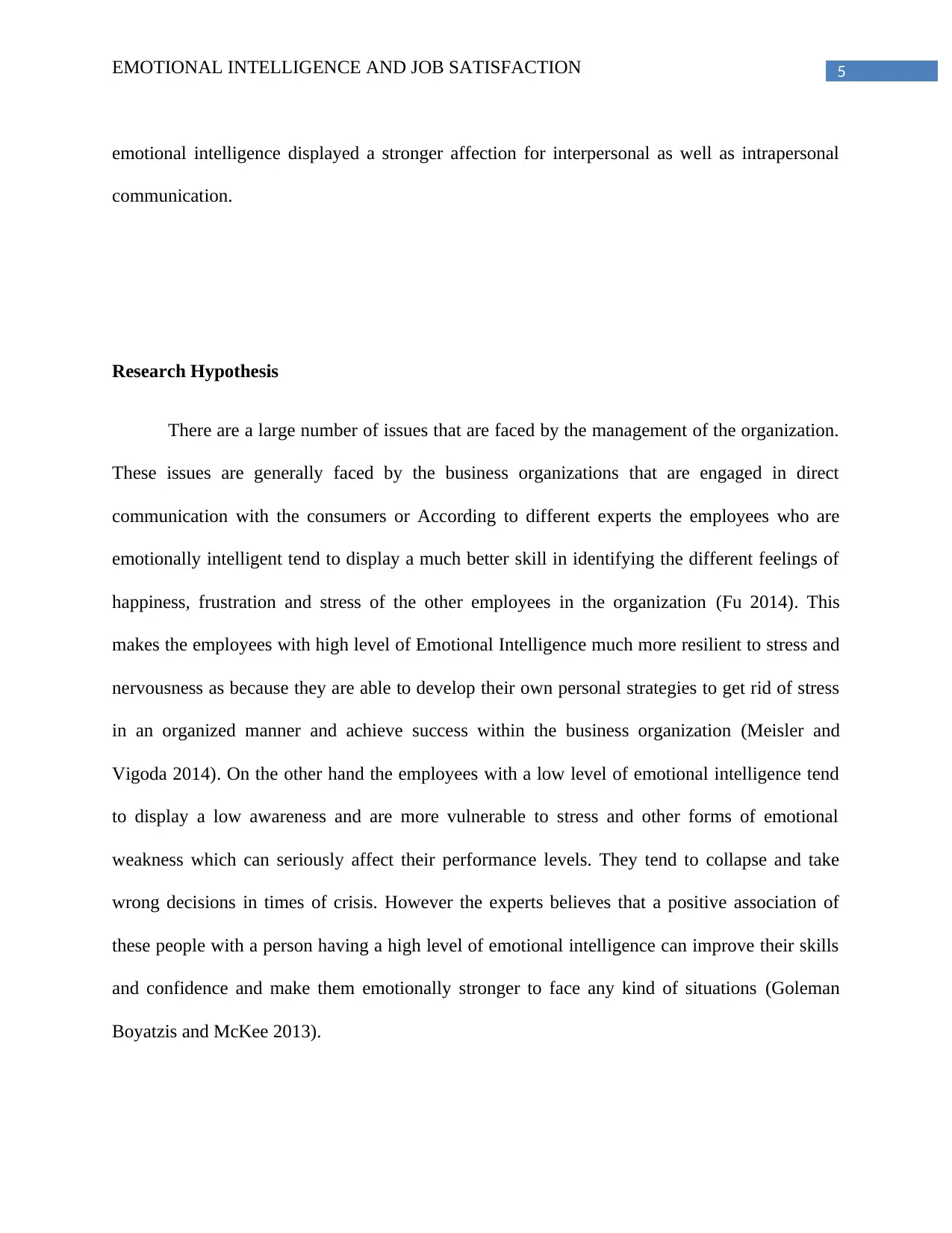
5EMOTIONAL INTELLIGENCE AND JOB SATISFACTION
emotional intelligence displayed a stronger affection for interpersonal as well as intrapersonal
communication.
Research Hypothesis
There are a large number of issues that are faced by the management of the organization.
These issues are generally faced by the business organizations that are engaged in direct
communication with the consumers or According to different experts the employees who are
emotionally intelligent tend to display a much better skill in identifying the different feelings of
happiness, frustration and stress of the other employees in the organization (Fu 2014). This
makes the employees with high level of Emotional Intelligence much more resilient to stress and
nervousness as because they are able to develop their own personal strategies to get rid of stress
in an organized manner and achieve success within the business organization (Meisler and
Vigoda 2014). On the other hand the employees with a low level of emotional intelligence tend
to display a low awareness and are more vulnerable to stress and other forms of emotional
weakness which can seriously affect their performance levels. They tend to collapse and take
wrong decisions in times of crisis. However the experts believes that a positive association of
these people with a person having a high level of emotional intelligence can improve their skills
and confidence and make them emotionally stronger to face any kind of situations (Goleman
Boyatzis and McKee 2013).
emotional intelligence displayed a stronger affection for interpersonal as well as intrapersonal
communication.
Research Hypothesis
There are a large number of issues that are faced by the management of the organization.
These issues are generally faced by the business organizations that are engaged in direct
communication with the consumers or According to different experts the employees who are
emotionally intelligent tend to display a much better skill in identifying the different feelings of
happiness, frustration and stress of the other employees in the organization (Fu 2014). This
makes the employees with high level of Emotional Intelligence much more resilient to stress and
nervousness as because they are able to develop their own personal strategies to get rid of stress
in an organized manner and achieve success within the business organization (Meisler and
Vigoda 2014). On the other hand the employees with a low level of emotional intelligence tend
to display a low awareness and are more vulnerable to stress and other forms of emotional
weakness which can seriously affect their performance levels. They tend to collapse and take
wrong decisions in times of crisis. However the experts believes that a positive association of
these people with a person having a high level of emotional intelligence can improve their skills
and confidence and make them emotionally stronger to face any kind of situations (Goleman
Boyatzis and McKee 2013).
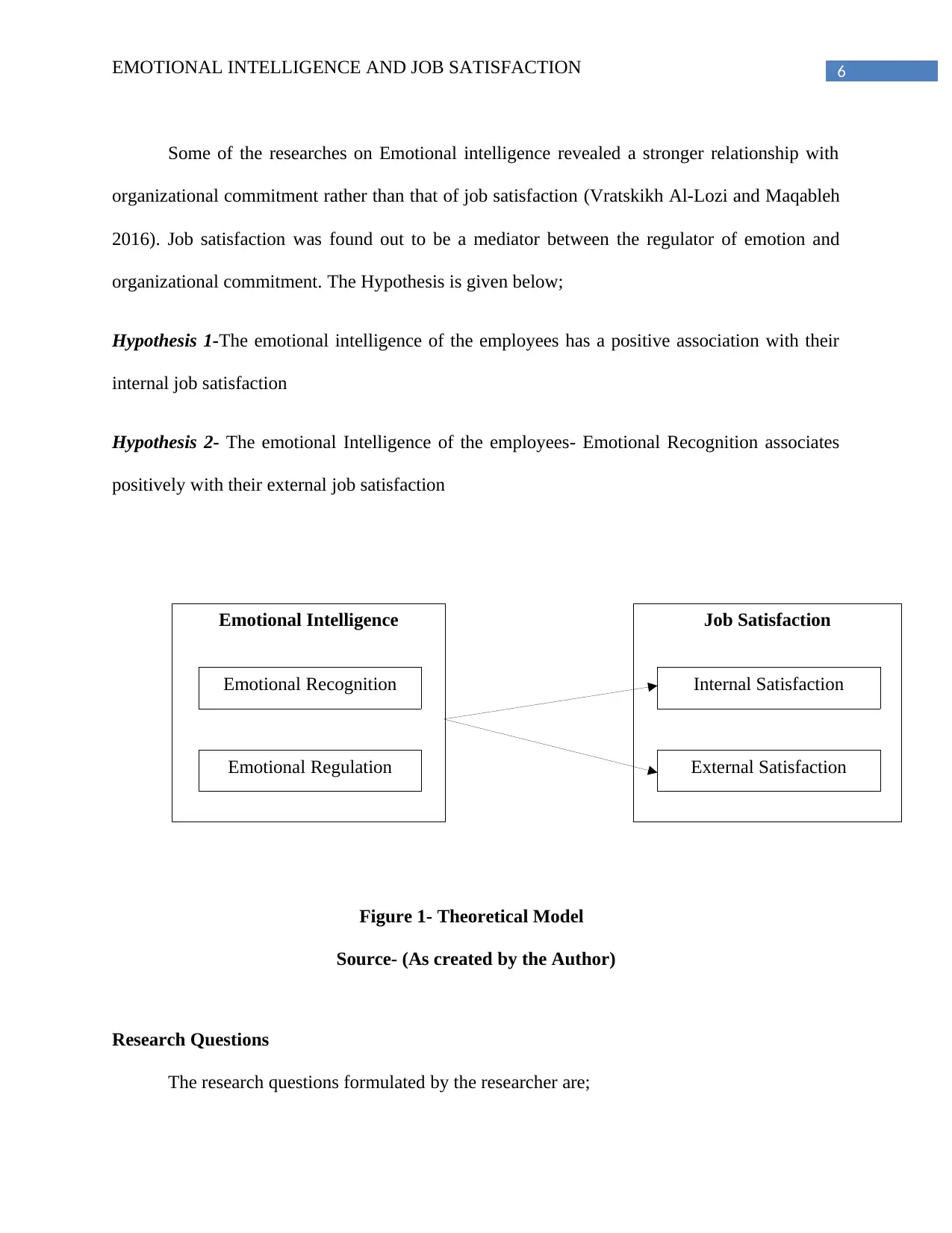
6EMOTIONAL INTELLIGENCE AND JOB SATISFACTION
Some of the researches on Emotional intelligence revealed a stronger relationship with
organizational commitment rather than that of job satisfaction (Vratskikh Al-Lozi and Maqableh
2016). Job satisfaction was found out to be a mediator between the regulator of emotion and
organizational commitment. The Hypothesis is given below;
Hypothesis 1-The emotional intelligence of the employees has a positive association with their
internal job satisfaction
Hypothesis 2- The emotional Intelligence of the employees- Emotional Recognition associates
positively with their external job satisfaction
Figure 1- Theoretical Model
Source- (As created by the Author)
Research Questions
The research questions formulated by the researcher are;
Emotional Intelligence Job Satisfaction
Emotional Recognition
Emotional Regulation
Internal Satisfaction
External Satisfaction
Some of the researches on Emotional intelligence revealed a stronger relationship with
organizational commitment rather than that of job satisfaction (Vratskikh Al-Lozi and Maqableh
2016). Job satisfaction was found out to be a mediator between the regulator of emotion and
organizational commitment. The Hypothesis is given below;
Hypothesis 1-The emotional intelligence of the employees has a positive association with their
internal job satisfaction
Hypothesis 2- The emotional Intelligence of the employees- Emotional Recognition associates
positively with their external job satisfaction
Figure 1- Theoretical Model
Source- (As created by the Author)
Research Questions
The research questions formulated by the researcher are;
Emotional Intelligence Job Satisfaction
Emotional Recognition
Emotional Regulation
Internal Satisfaction
External Satisfaction
⊘ This is a preview!⊘
Do you want full access?
Subscribe today to unlock all pages.

Trusted by 1+ million students worldwide
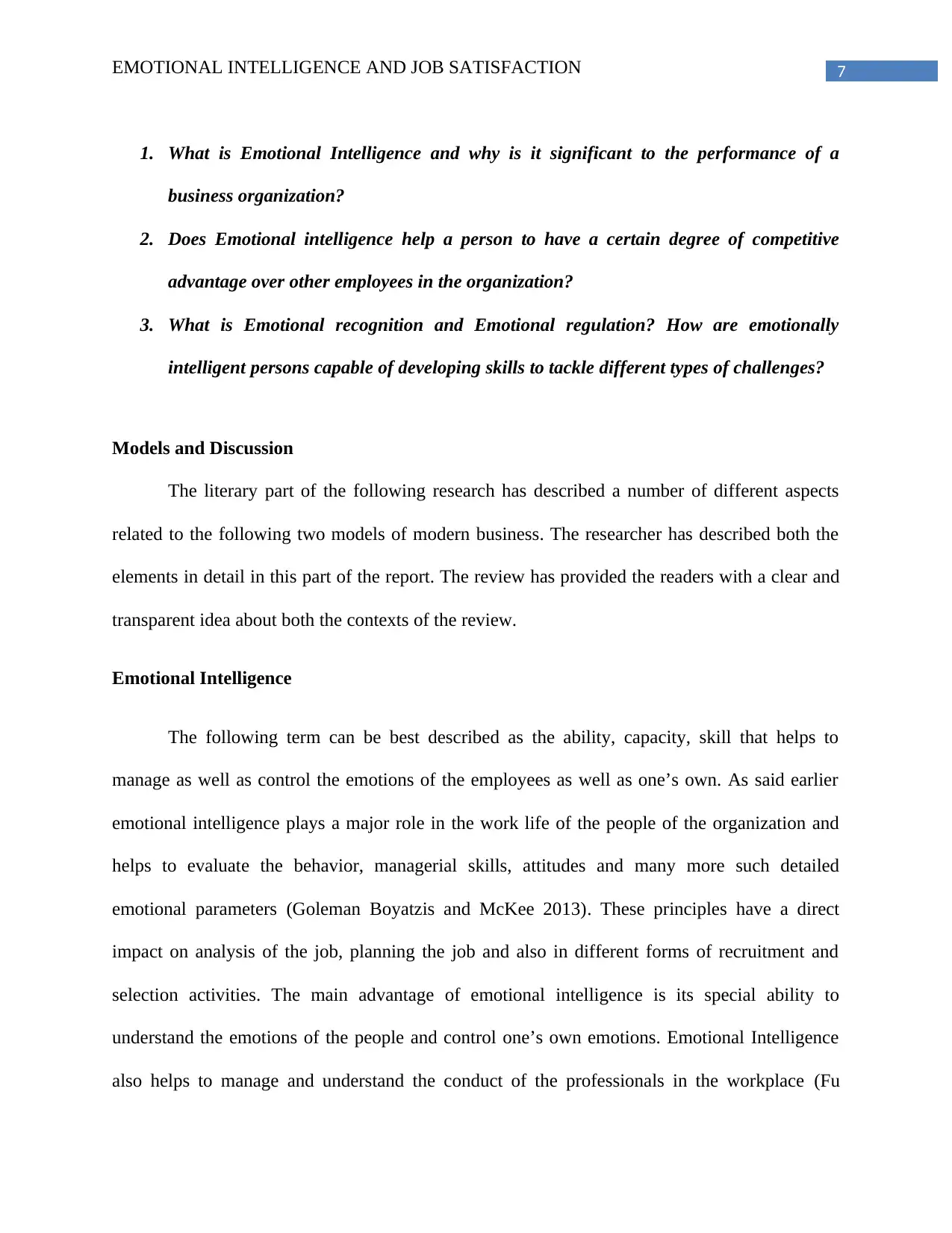
7EMOTIONAL INTELLIGENCE AND JOB SATISFACTION
1. What is Emotional Intelligence and why is it significant to the performance of a
business organization?
2. Does Emotional intelligence help a person to have a certain degree of competitive
advantage over other employees in the organization?
3. What is Emotional recognition and Emotional regulation? How are emotionally
intelligent persons capable of developing skills to tackle different types of challenges?
Models and Discussion
The literary part of the following research has described a number of different aspects
related to the following two models of modern business. The researcher has described both the
elements in detail in this part of the report. The review has provided the readers with a clear and
transparent idea about both the contexts of the review.
Emotional Intelligence
The following term can be best described as the ability, capacity, skill that helps to
manage as well as control the emotions of the employees as well as one’s own. As said earlier
emotional intelligence plays a major role in the work life of the people of the organization and
helps to evaluate the behavior, managerial skills, attitudes and many more such detailed
emotional parameters (Goleman Boyatzis and McKee 2013). These principles have a direct
impact on analysis of the job, planning the job and also in different forms of recruitment and
selection activities. The main advantage of emotional intelligence is its special ability to
understand the emotions of the people and control one’s own emotions. Emotional Intelligence
also helps to manage and understand the conduct of the professionals in the workplace (Fu
1. What is Emotional Intelligence and why is it significant to the performance of a
business organization?
2. Does Emotional intelligence help a person to have a certain degree of competitive
advantage over other employees in the organization?
3. What is Emotional recognition and Emotional regulation? How are emotionally
intelligent persons capable of developing skills to tackle different types of challenges?
Models and Discussion
The literary part of the following research has described a number of different aspects
related to the following two models of modern business. The researcher has described both the
elements in detail in this part of the report. The review has provided the readers with a clear and
transparent idea about both the contexts of the review.
Emotional Intelligence
The following term can be best described as the ability, capacity, skill that helps to
manage as well as control the emotions of the employees as well as one’s own. As said earlier
emotional intelligence plays a major role in the work life of the people of the organization and
helps to evaluate the behavior, managerial skills, attitudes and many more such detailed
emotional parameters (Goleman Boyatzis and McKee 2013). These principles have a direct
impact on analysis of the job, planning the job and also in different forms of recruitment and
selection activities. The main advantage of emotional intelligence is its special ability to
understand the emotions of the people and control one’s own emotions. Emotional Intelligence
also helps to manage and understand the conduct of the professionals in the workplace (Fu
Paraphrase This Document
Need a fresh take? Get an instant paraphrase of this document with our AI Paraphraser
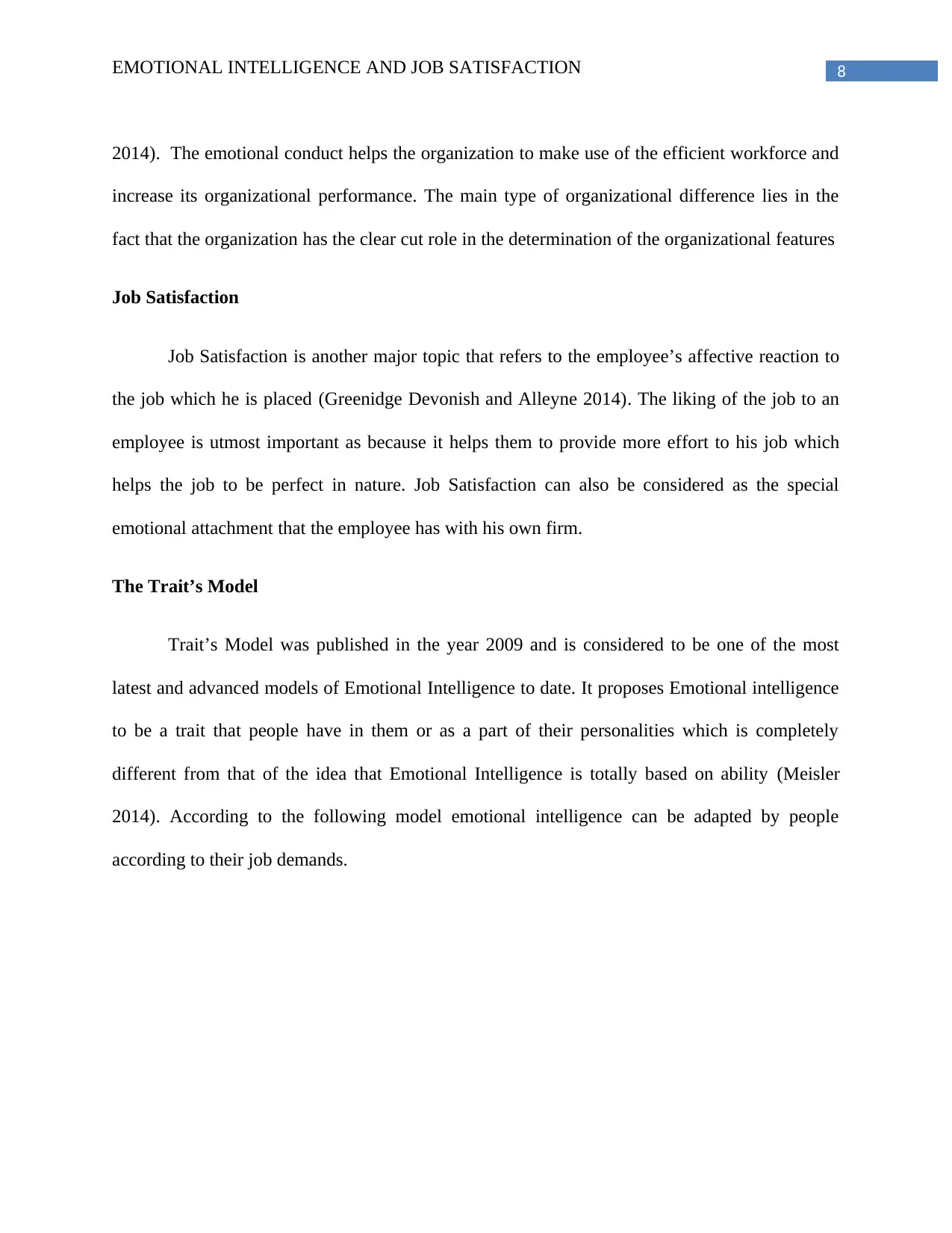
8EMOTIONAL INTELLIGENCE AND JOB SATISFACTION
2014). The emotional conduct helps the organization to make use of the efficient workforce and
increase its organizational performance. The main type of organizational difference lies in the
fact that the organization has the clear cut role in the determination of the organizational features
Job Satisfaction
Job Satisfaction is another major topic that refers to the employee’s affective reaction to
the job which he is placed (Greenidge Devonish and Alleyne 2014). The liking of the job to an
employee is utmost important as because it helps them to provide more effort to his job which
helps the job to be perfect in nature. Job Satisfaction can also be considered as the special
emotional attachment that the employee has with his own firm.
The Trait’s Model
Trait’s Model was published in the year 2009 and is considered to be one of the most
latest and advanced models of Emotional Intelligence to date. It proposes Emotional intelligence
to be a trait that people have in them or as a part of their personalities which is completely
different from that of the idea that Emotional Intelligence is totally based on ability (Meisler
2014). According to the following model emotional intelligence can be adapted by people
according to their job demands.
2014). The emotional conduct helps the organization to make use of the efficient workforce and
increase its organizational performance. The main type of organizational difference lies in the
fact that the organization has the clear cut role in the determination of the organizational features
Job Satisfaction
Job Satisfaction is another major topic that refers to the employee’s affective reaction to
the job which he is placed (Greenidge Devonish and Alleyne 2014). The liking of the job to an
employee is utmost important as because it helps them to provide more effort to his job which
helps the job to be perfect in nature. Job Satisfaction can also be considered as the special
emotional attachment that the employee has with his own firm.
The Trait’s Model
Trait’s Model was published in the year 2009 and is considered to be one of the most
latest and advanced models of Emotional Intelligence to date. It proposes Emotional intelligence
to be a trait that people have in them or as a part of their personalities which is completely
different from that of the idea that Emotional Intelligence is totally based on ability (Meisler
2014). According to the following model emotional intelligence can be adapted by people
according to their job demands.
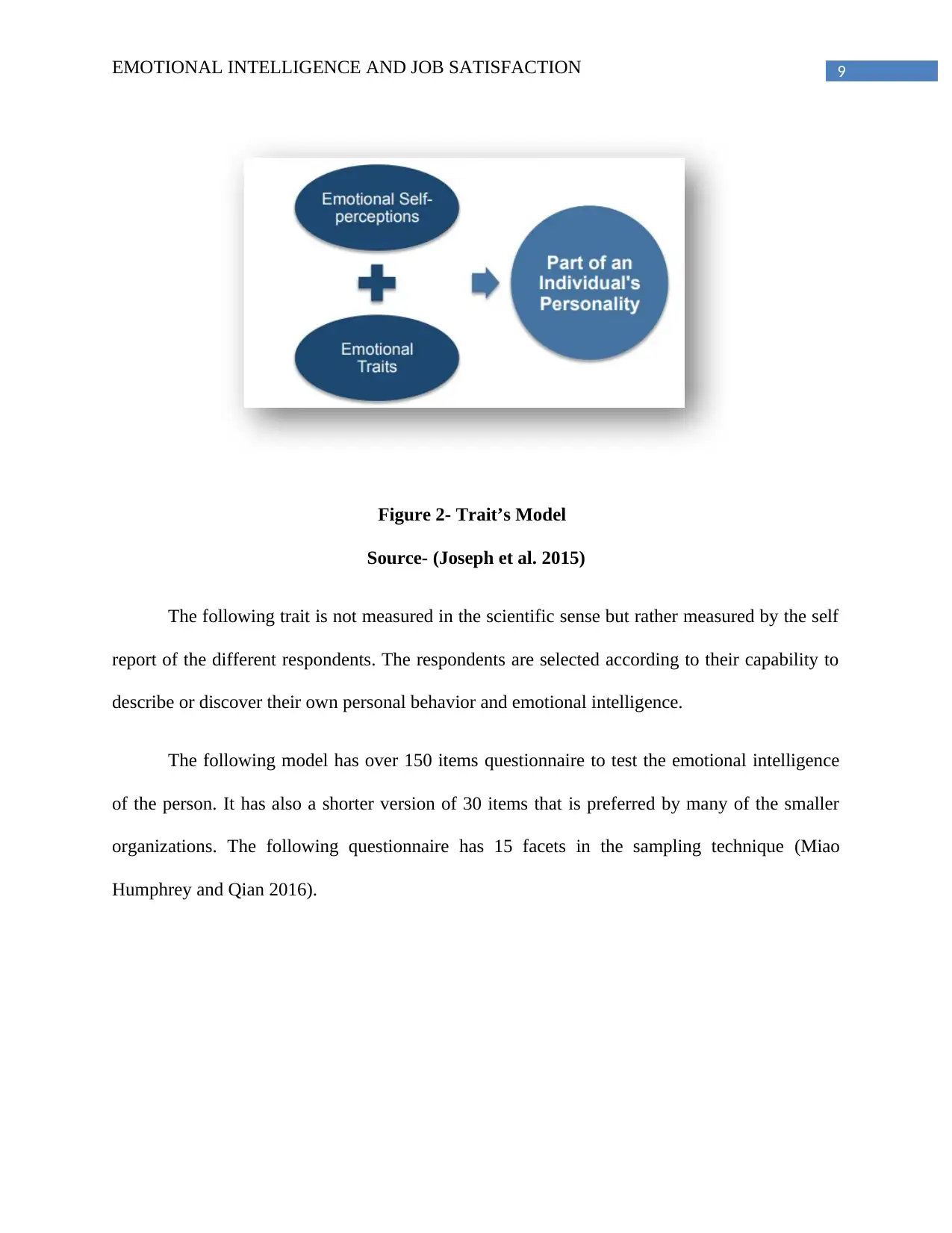
9EMOTIONAL INTELLIGENCE AND JOB SATISFACTION
Figure 2- Trait’s Model
Source- (Joseph et al. 2015)
The following trait is not measured in the scientific sense but rather measured by the self
report of the different respondents. The respondents are selected according to their capability to
describe or discover their own personal behavior and emotional intelligence.
The following model has over 150 items questionnaire to test the emotional intelligence
of the person. It has also a shorter version of 30 items that is preferred by many of the smaller
organizations. The following questionnaire has 15 facets in the sampling technique (Miao
Humphrey and Qian 2016).
Figure 2- Trait’s Model
Source- (Joseph et al. 2015)
The following trait is not measured in the scientific sense but rather measured by the self
report of the different respondents. The respondents are selected according to their capability to
describe or discover their own personal behavior and emotional intelligence.
The following model has over 150 items questionnaire to test the emotional intelligence
of the person. It has also a shorter version of 30 items that is preferred by many of the smaller
organizations. The following questionnaire has 15 facets in the sampling technique (Miao
Humphrey and Qian 2016).
⊘ This is a preview!⊘
Do you want full access?
Subscribe today to unlock all pages.

Trusted by 1+ million students worldwide
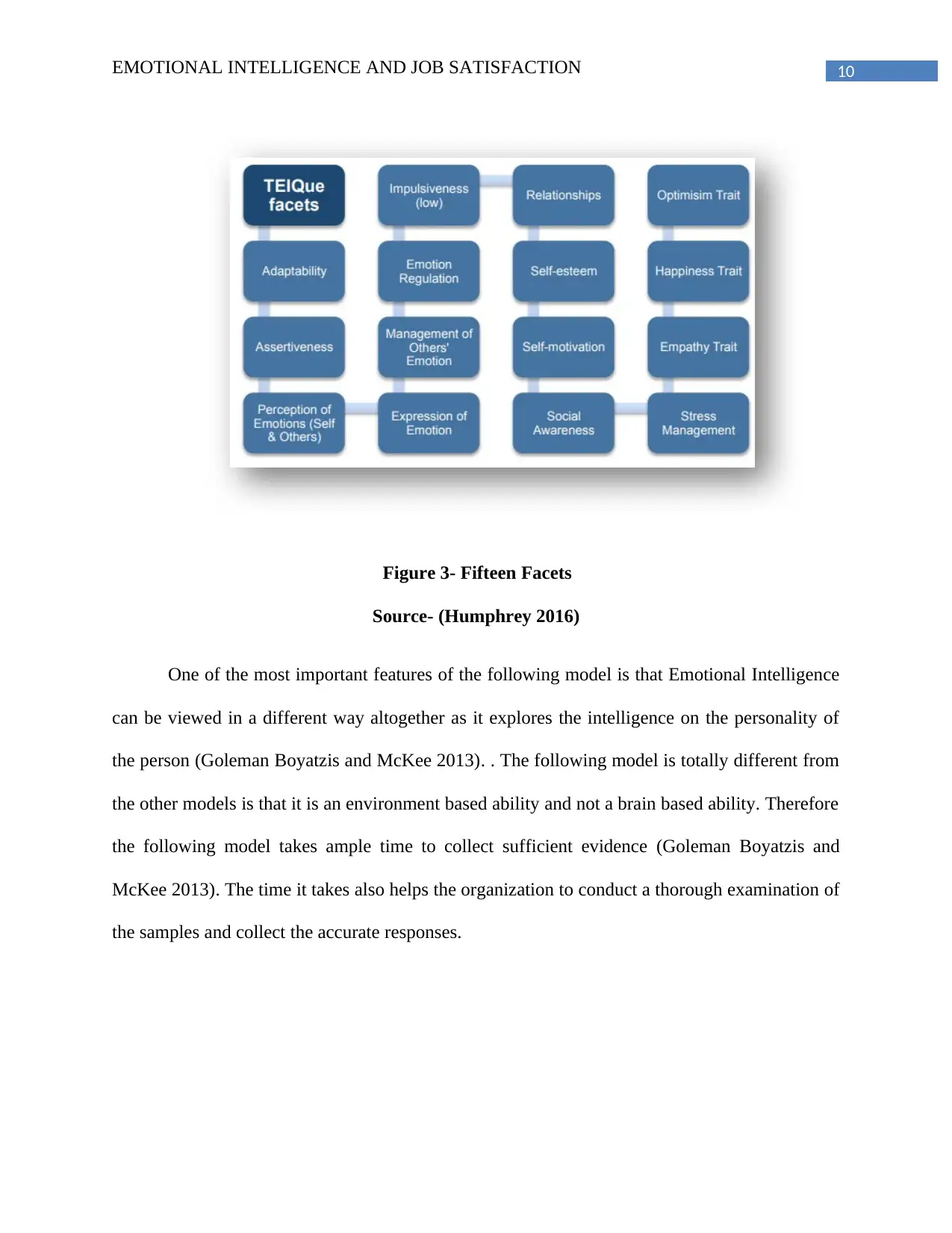
10EMOTIONAL INTELLIGENCE AND JOB SATISFACTION
Figure 3- Fifteen Facets
Source- (Humphrey 2016)
One of the most important features of the following model is that Emotional Intelligence
can be viewed in a different way altogether as it explores the intelligence on the personality of
the person (Goleman Boyatzis and McKee 2013). . The following model is totally different from
the other models is that it is an environment based ability and not a brain based ability. Therefore
the following model takes ample time to collect sufficient evidence (Goleman Boyatzis and
McKee 2013). The time it takes also helps the organization to conduct a thorough examination of
the samples and collect the accurate responses.
Figure 3- Fifteen Facets
Source- (Humphrey 2016)
One of the most important features of the following model is that Emotional Intelligence
can be viewed in a different way altogether as it explores the intelligence on the personality of
the person (Goleman Boyatzis and McKee 2013). . The following model is totally different from
the other models is that it is an environment based ability and not a brain based ability. Therefore
the following model takes ample time to collect sufficient evidence (Goleman Boyatzis and
McKee 2013). The time it takes also helps the organization to conduct a thorough examination of
the samples and collect the accurate responses.
Paraphrase This Document
Need a fresh take? Get an instant paraphrase of this document with our AI Paraphraser
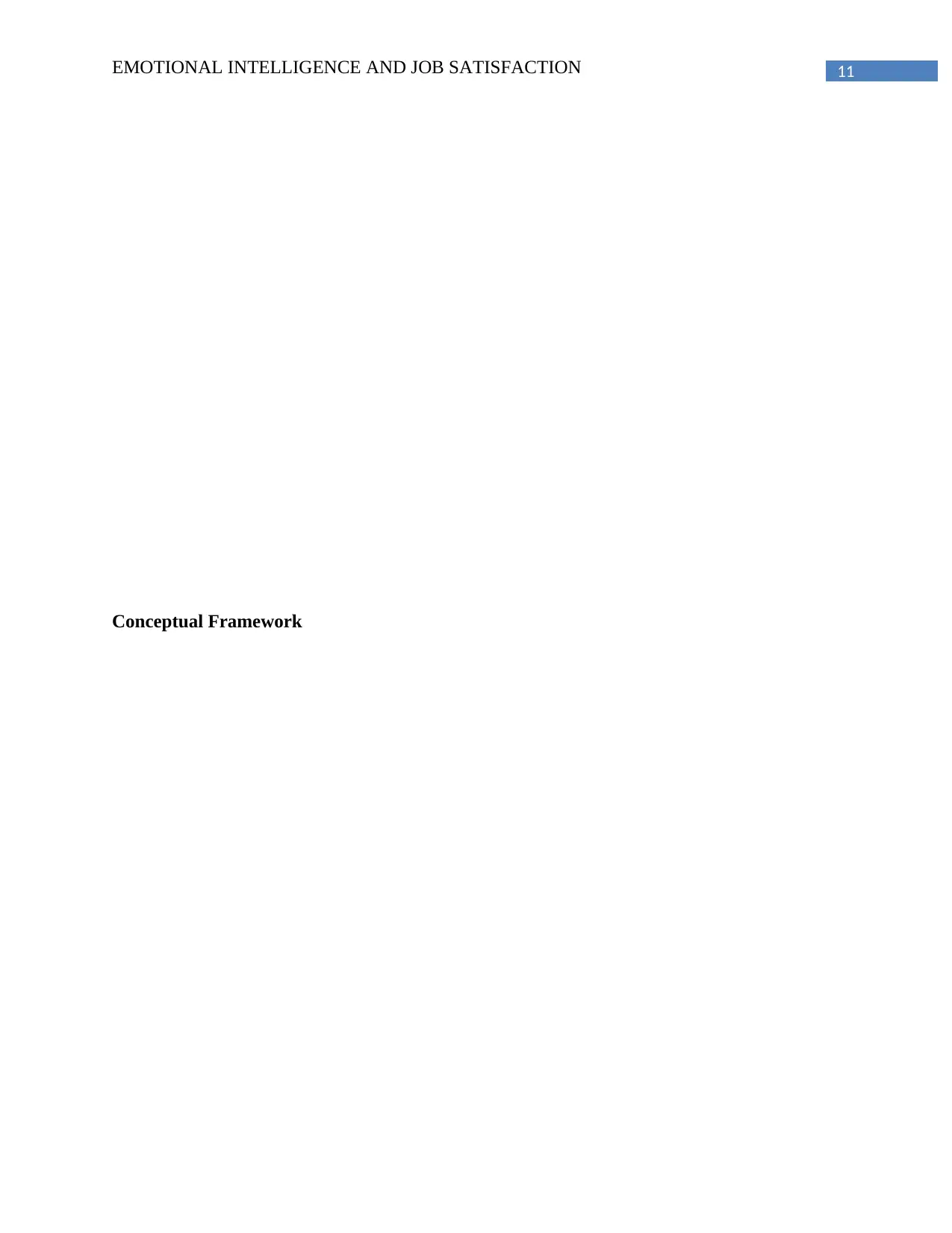
11EMOTIONAL INTELLIGENCE AND JOB SATISFACTION
Conceptual Framework
Conceptual Framework
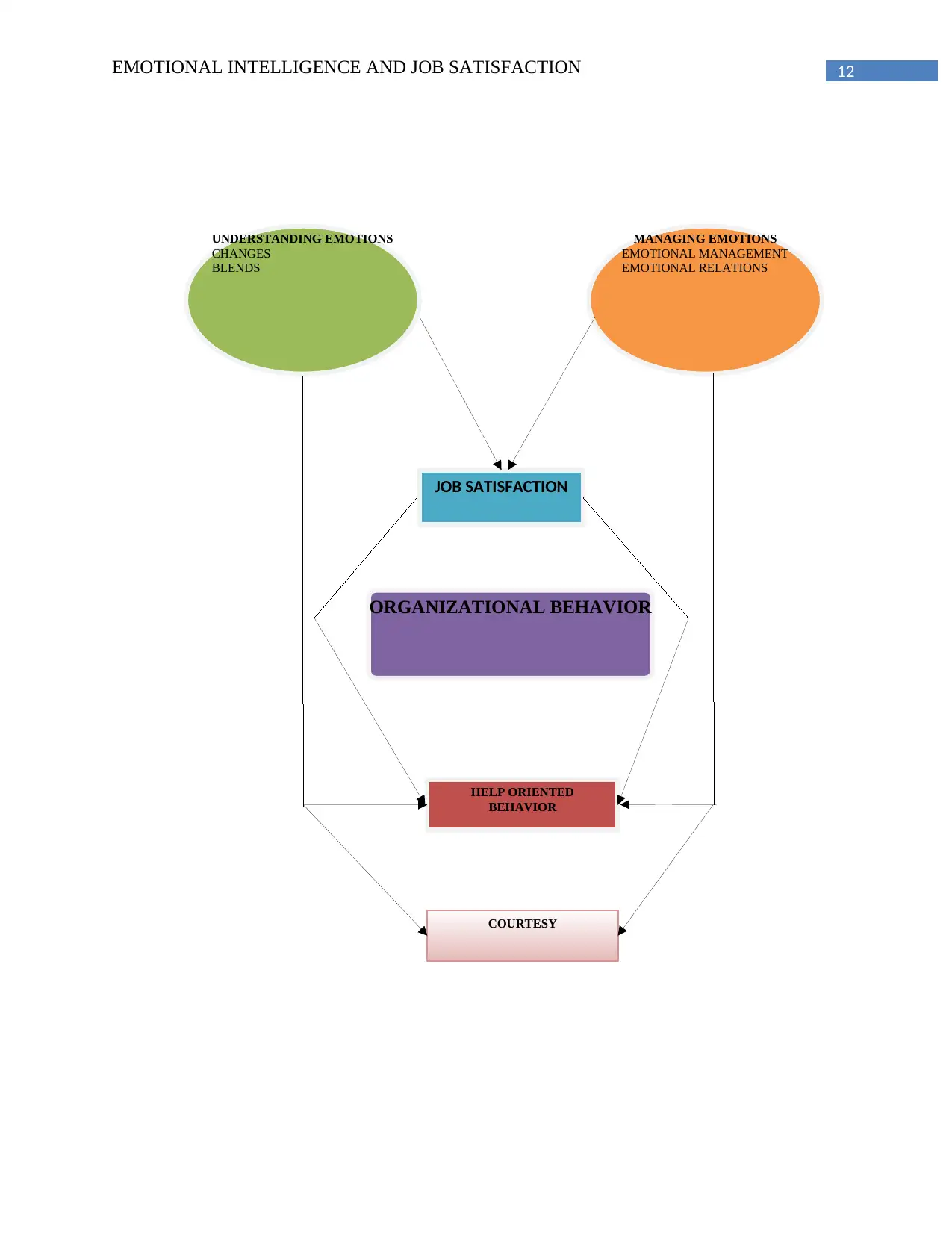
12
UNDERSTANDING EMOTIONS
CHANGES
BLENDS
MANAGING EMOTIONS
EMOTIONAL MANAGEMENT
EMOTIONAL RELATIONS
JOB SATISFACTION
ORGANIZATIONAL BEHAVIOR
HELP ORIENTED
BEHAVIOR
COURTESY
EMOTIONAL INTELLIGENCE AND JOB SATISFACTION
UNDERSTANDING EMOTIONS
CHANGES
BLENDS
MANAGING EMOTIONS
EMOTIONAL MANAGEMENT
EMOTIONAL RELATIONS
JOB SATISFACTION
ORGANIZATIONAL BEHAVIOR
HELP ORIENTED
BEHAVIOR
COURTESY
EMOTIONAL INTELLIGENCE AND JOB SATISFACTION
⊘ This is a preview!⊘
Do you want full access?
Subscribe today to unlock all pages.

Trusted by 1+ million students worldwide
1 out of 22
Related Documents
Your All-in-One AI-Powered Toolkit for Academic Success.
+13062052269
info@desklib.com
Available 24*7 on WhatsApp / Email
![[object Object]](/_next/static/media/star-bottom.7253800d.svg)
Unlock your academic potential
Copyright © 2020–2026 A2Z Services. All Rights Reserved. Developed and managed by ZUCOL.




